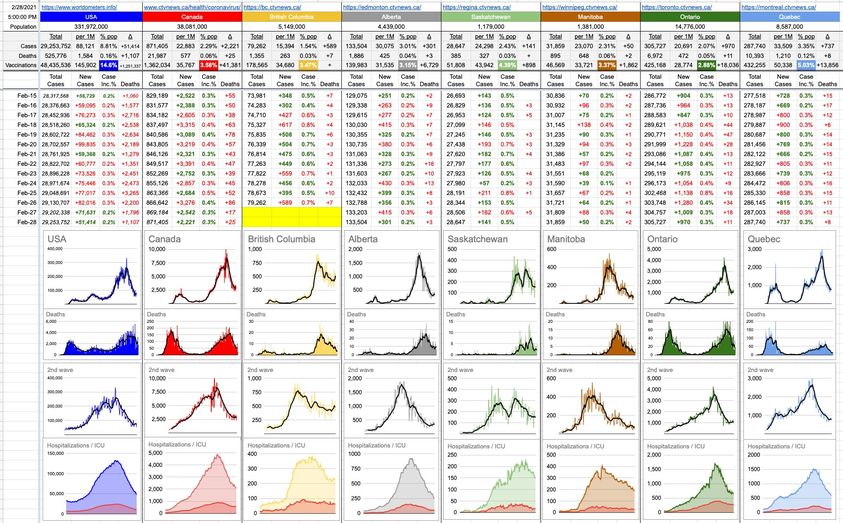Welcome to the end of February. Tomorrow begins March… and you’ll recall last year, March 2020 felt like the longest month in history. To some extent, it’s been a year but it feels like we’re still in it. Happy Sunday, March 334th.
At this time last year, Canada had seen 15 cases of Covid-19. Seven of them were here in B.C. Another 7 were in Ontario, and the other was in Quebec. By the end of March 2020, Canada had over 8,000 cases and 100 deaths. A month later, the case-count was over 50,000 and the deaths were around 3,000 and we were all freaking the hell out.
We’re all too exhausted to be freaking out anymore, and we’ve realized the numbers didn’t follow that trajectory. Had they, my quick math implies we’d all have caught it by the end of July, and we’d all have been dead by the end of Summer. None of that happened, and none of that will… but it’s worth thinking back to how things felt at the time, just to remember that things can change quickly and we shouldn’t take anything for granted.
On the flipside, like a lot of people, I’m actually starting to wonder what society is going to look like after this is all over. Many profound changes, and I’m not just talking about remote work and Zoom and virtual offices and things like that; let’s recall that in no small part, the end of the 1918 pandemic launched the roaring 20s… a decade of romanticised, glamorous fun that lasted until the economy collapsed and The Depression took over.
But here’s something else that with great subtlety changed the world drastically…
Up until 1918, there were steam cars and there were electric cars… and internal combustion cars were around, but not so popular. People with steam cars used to fill them up at horse troughs… free water, everywhere… but, with the pandemic, and standing water being a great collection point for mosquitos, those troughs got covered up… and the car manufacturers like Henry Ford seized that opportunity to tell the world how awesome gas-powered cars were. No waiting for it to charge, no waiting for the water to heat up, no chance of a steam explosion. Gas stations sprung up everywhere… and a hundred years of R&D that’s gone into gas-powered cars might have gone into steam-generated engines and/or electrical systems and batteries. Hard to imagine what society might look like… and how it would’ve evolved… without this dependency on oil.
I wonder what’s changing these days that’ll have such a profound effect on the entire world. What will they be talking about 100 years from now as one of the largest radical shifts caused by all of this?
I don’t know… I’m just asking the question… but happy to hear you thoughts.
23 Likes, 3 Shares



I personally know 3 cases that had happened by this date a year ago, but which were not counted in that total of 15. The odds are rather unlikely that I knew even a significant fraction of the uncounted cases. So who knows how many we’ve actually had?
I think the world will be so much different and I am fearful that much of it won’t be for the good. The damage this pandemic has caused to so many aspects of the world, so many people dying, so many people lost work and business, people crushed by mental healthy issues and so many relationships with other people ruined. Will we actually see sports or concerts, things with big crowds that brought us joy, ever return to what they were? How can they? What happens when some people get the vaccine and others don’t? That can only cause tensions. I hope I am wrong but if, or when, things open up (and in Ontario that looks like never), the damage has been done.
Well, to be clear, steam engines don’t run on water… water is just the medium used to transform energy into motion. Steam engines of the day ran on wood and coal… and could not be as efficient as gasoline engines. You could have burned gasoline to generate steam as well, but that would not be as efficient as detonating gasoline to create rotational motion.
Gasoline engines haven’t persisted because of some vast conspiracy either – gasoline is an incredibly efficient storage mechanism for energy. One that still, pound-for-pound, hasn’t been beat.
A pound of gasoline contains 2.2*10^7 joules of energy. A pound of coal contains 1.6*10^7. And you can extract the gasoline energy far more effectively.
Being a liquid helps too – it stores well, moves around well, and is easier to vaporize for optimized oxidation.
Electric cars only really took off once advanced versions of the lithium-ion battery emerged – and the original lithium-ion batteries were created in the early 80s. So arguably, all of this has happened rather quickly.
Could it go faster? Sure, by throwing lots of money at it.
That being said, yeah, I’m wondering what the new normal will look like a year or so from now… because it sure isn’t going to be the old normal.
2 things:
1) The integration of computers with human brains. Like the movie “Upgrade” if you’ve seen that.
2) Massive increases in life expectancy. From around 80 years today — to over 500 years by 2120. That’s a guess. Maybe it will be 1,000. But in any case, it will make our sad 80 years seem like a sick joke.
The changes from the start of the 20th century to the end of the 20th century were breathtaking and transformative. Mostly because the changes were driven by new technologies. There is unlikely to be similar transformative change by the end of the 21st century. We’re in a period of stagnation & have been for 50 years. Most of our technology is just incremental improvements of existing technology. A 2021 car still does what a 1970 car did, just better. A flight between cities takes just as long now as it did 50 years ago.
Some people say physics is the only real science. Well physics has been in stagnation for 50 years. They know almost nothing new that they didn’t know 50 years ago. Sure, they can smash particles into each other, then observe the Higgs boson. But it was theorised in the early 1960s, they didn’t discover anything they didn’t already know was there. Probably the limiting factor is energy. The only real sector that has not seen stagnation has been in computing. Interestingly that sector did not require any more energy than could be provided 50 years ago.
We’ll continue to improve the technology we’ve already got, but unless something like AI can advance understanding. Doubtful radically different technologies to what we’ve got will transform the world any time soon.
https://rootsofprogress.org/where-is-my-flying-car
Well I really hope it will be geography-based politics and small operation permaculture / self-sustaining farms, but it could be…. those small nuclear reactors Richard was talking about, energy from space (also a Richard, Bicycle Repair Man thing), the rise of a new, adapted kind of socialism, the ressurrection of a better UN / planet-wide political system, maybe universal basic income which in itself cld change everything imo, hmm….bitcoin. On the negative side – I think the heavy use of IT and radio-based communications may have some unforseen negative impacts. Just some thoughts. Personally looking forward to wearing flapper dresses and drinking way too much.